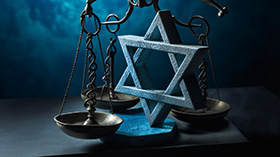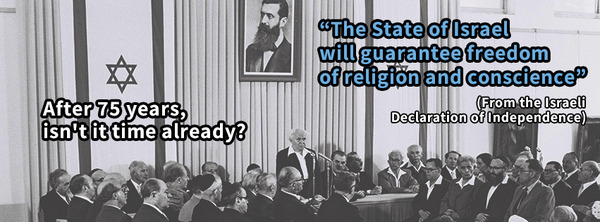Between Freedom and Independence
We have just concluded the celebration of Passover, the Festival of Freedom, and next week we will celebrate Israeli Independence Day. Both holidays have an added special meaning this year. The festival of freedom reminds us that freedom is not granted without a struggle, and Independence Day heightens our awareness that independence gained by blood 75 years ago is likewise not to be taken for granted nor guaranteed forever.
23/04/2023 11:30
Tags:

Religious Freedom; Judicial Independence
In recent months, the Israeli public has found itself fighting for its freedom, not against external threats such as those encountered throughout Israel's history, but rather against threats from within. These threats originated from government leaders, from the combination of the messianic right and fundamentalist ultra-Orthodox Judaism, who joined forces in an attempt to change the democratic character of the State of Israel, and by doing so – harm the liberties that are at its core. This is not about the legitimate dispute between the political right and left, and it is not about ongoing attempts to improve governance, including the judiciary. The Judicial coup orchestrated by Minister of Justice Levin and Chairman of the Constitution, Law and Justice Committee MK Rothman is not an expression of the political right and does not represent an honest pursuit for mending the legal system.

Photo By Oren Rozen - Own work, CC BY-SA 4.0, WikiMedia Commons
An example of the cynicism in the initiators' arguments is their claim that the initiative (for judicial reform) is intended to restore the public trust in the legal system. This trust, they say, has been lost ever since the presidency of Prof. Aharon Barak, from which time the Supreme Court has followed a path of “judicial dictatorship”. They argue that the reform should be carried out by the coalition majority (shaky as it is) because this coalition, as represented in the government and in the Knesset, is the one that expresses the will of the people and is necessary in order to return the power to the people. Minister David Amsalem, one of the government leaders, recently even went so far as to call for the prosecution of the former Chief Justice, Prof. Barak, and the current Chief Justice, Esther Hayut, on the grounds of an attempted coup, no less. Such utter nonsense characterizes the statements of many of the speakers of the current government. The public protest against the attempt of Levin, Rothman and their colleagues (a protest unprecedented in Israel’s history), is the main ray of light and optimism. In addition to the widespread protests, numerous polls conducted in the past few months show without exception that the majority of the public opposes the elements of the planned “overhaul”. The international community, including that of Jewish Diaspora leadership, has also mobilized against the attempt to convert Israeli democracy into a dictatorship ( i.e. an unchecked government free of any legal restraint). All of these encourage us with the confidence that "we shall overcome".
As mentioned, the cynicism and artificiality of the afore-mentioned argument is easily apparent. For years, the Israel Democracy Institute [IDI] has been measuring the degree of public trust in government institutions, and indeed, it is possible to see an alarming decrease in the level of public trust in all these institutions. The initiators of the legal coup point only to the decrease of trust in the Supreme Court, and indeed such a decrease has been measured. In the polls
In recent months, the Israeli public has found itself fighting for its freedom, not against external threats such as those encountered throughout Israel's history, but rather against threats from within."
of the Democracy Institute, for example, it can be observed that while the Jewish public's trust in the Supreme Court according to the of the annual polls in the years 2003-2022 was on average 59.5%, the rate of trust in the polls conducted in 2022 dropped to only 42%. However, singling out this one piece of data is not only a half-truth but is a malicious distortion.
Since while the Supreme Court continues to occupy the third place in the level of public trust (after the IDF and the President of the State), the level of trust in the government, the Knesset, and the political parties is dramatically lower (24%; 18.5% and 8.5% respectively). Moreover, a comparison of the rate of decline in the level of public trust during the past year in comparison to the average level between 2003-2022 is instructive: While the decline in trust in the Supreme Court during this period was 30% (in no small part due to the malicious attacks by elements from the messianic right and the ultra-orthodox leadership) the decline of trust in the government was 36%, in the Knesset - 49%, and in the political parties - 60%, for this self-same period! This is what is meant by the Sages when they said: "The one who discredits others – is himself at fault”. Before these politicians, who seek to remove from their path the judicial review by the Supreme Court, can be taken seriously as they blame the Court and pretend to be genuinely guided by concern for the decrease of public trust in the court, they would do better to take an honest look at themselves and act to restore public trust in themselves, in the government, in the Knesset and in the political parties!

Next week we will celebrate Israel’s 75th Independence Day. The celebrations will be characterized by joy mixed with anger and with a determination to protect the character of the State of Israel as a Jewish and democratic state from those who threaten it from within. It is not just a matter of suspending the legislative initiatives for a while, nor even canceling them. This time we and world Jewish leadership that is supporting the protest, should not be satisfied with merely removing the threat, but must take the necessary steps to constitutionally anchor the fundamental principles that are now at the center of the struggle: the constitutional status of the Basic Laws, the judicial review authority of the Supreme Court, reinforcing the authority of the gatekeepers (The Attorney General and the legal advisors of the different ministries), ensuring non-politicization in the appointments of the judges and gatekeepers, and no less important than all of these: granting constitutional status to the basic values of the Declaration of Independence - equality without distinction of religion, race or gender, and freedom of religion and conscience!
Hiddush wishes all our readers - a Happy Independence Day and a renewal of our commitment to democracy, equality and freedom of religion.